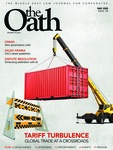Key considerations for property insurance policies during COVID-19

According to a new report by Marsh, evaluating property insurance policies during the outbreak of COVID-19 will allow businesses to upscale their resilience and recovery opportunities; putting them ahead of their competitors post the current crisis.
The pandemic has led many companies to search for property and other insurance policies as a measure to mitigate financial loss. In their report, Marsh advises organisations to work closely with their brokers, counsel and other advisors to overcome potential challenges.
“In light of the COVID-19 events, we strongly urge all businesses to communicate with their insurance consultant to gain an understanding of how their policies will respond to any ongoing financial loss. The pace and scope of government actions globally is changing daily, it is therefore essential that businesses act now to minimise disruption, respond to the new normal and start to build recovery and rebound strategies for the future.” said Christos Adamantiadis, CEO of Marsh Middle East & Africa.
As the virus continues to rapidly spread across the MENA region, some countries have shut down or enforced heavy restrictions on many public activities. This has subsequently caused a decline in economic activity. Many property insurance policies include coverage for business interruption loss by civil authority however, during this time insurers are more likely to view those coverages as being triggered only by insured physical loss or damage. Therefore, Marsh expects that many insurers will deny cover where the virus is suspected to be present, even if physical loss or damage takes place.
Furthermore, Marsh has highlighted four ways in which insurers may respond to losses related to the coronavirus:
Decontamination costs: this commonly addresses the enforcement of either a law or ordinance, or by the action of a government authority due to the actual presence of the contaminants following insured physical loss or damage to insured property by a covered cause of loss. Communicable disease clean-up: this provides coverage for reasonable and necessary costs for the cleanup, removal, and disposal of covered property due to the actual presence of a communicable disease on premises. Interruption by communicable disease: this extends the business interruption or time element coverage provided within the policy resulting from an order of an authorised governmental agency pertaining to the communicable disease occurring at the insured’s premise. Interruption by civil authority: according to insurers, a pronouncement by a civil authority, as the policy defines it, is often insufficient to qualify as a covered cause of loss and insurers may not respond to a business interruption or time element loss as a result. The coverage will depend on the sector of the business as well as the financial losses to changes or delays in activity.
Adamantiadis concluded, “We recommend all businesses evaluate their policies thoroughly, including any extensions, with their brokers and claims consultants to better understand their terms and conditions. Reaching out to insurance and risk experts for guidance and advice is crucial to protect your business and build resilience against the uncertain economic backdrop of COVID-19.”

























































































































